Unit 5 Amazing things Grammar_ Simple past tense (I) 课件(36张PPT)
文档属性
| 名称 | Unit 5 Amazing things Grammar_ Simple past tense (I) 课件(36张PPT) |  | |
| 格式 | ppt | ||
| 文件大小 | 2.1MB | ||
| 资源类型 | 教案 | ||
| 版本资源 | 牛津译林版 | ||
| 科目 | 英语 | ||
| 更新时间 | 2021-03-18 19:59:10 | ||
图片预览

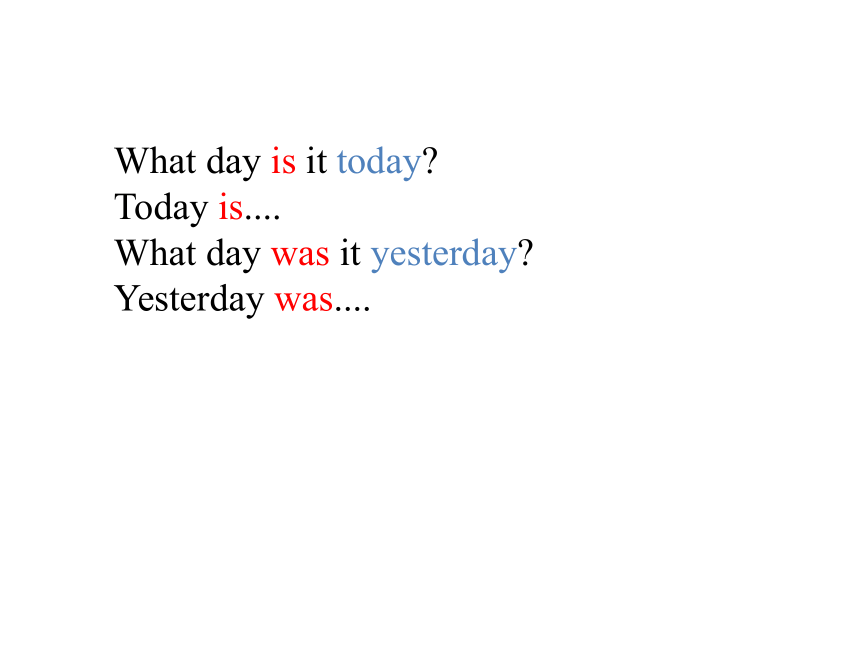
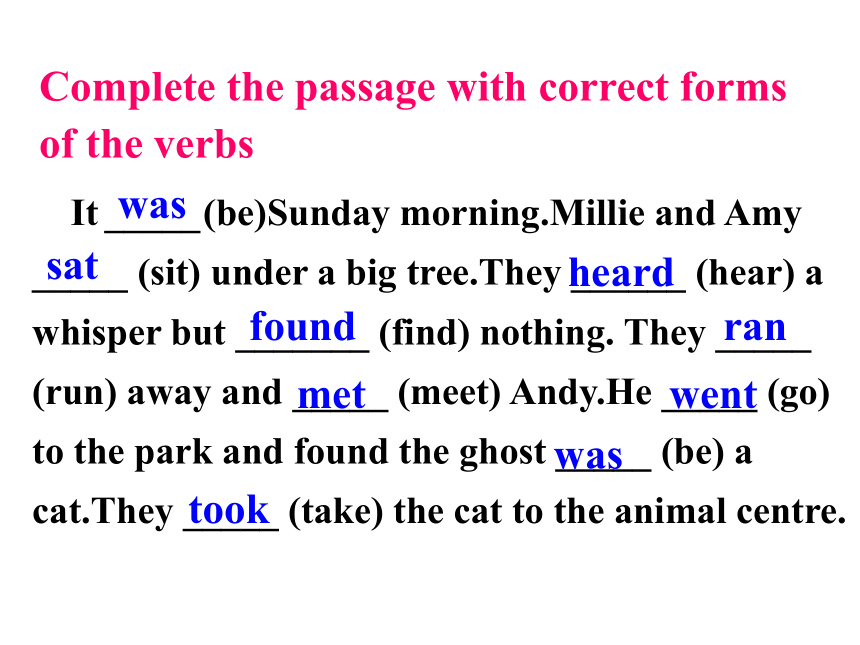
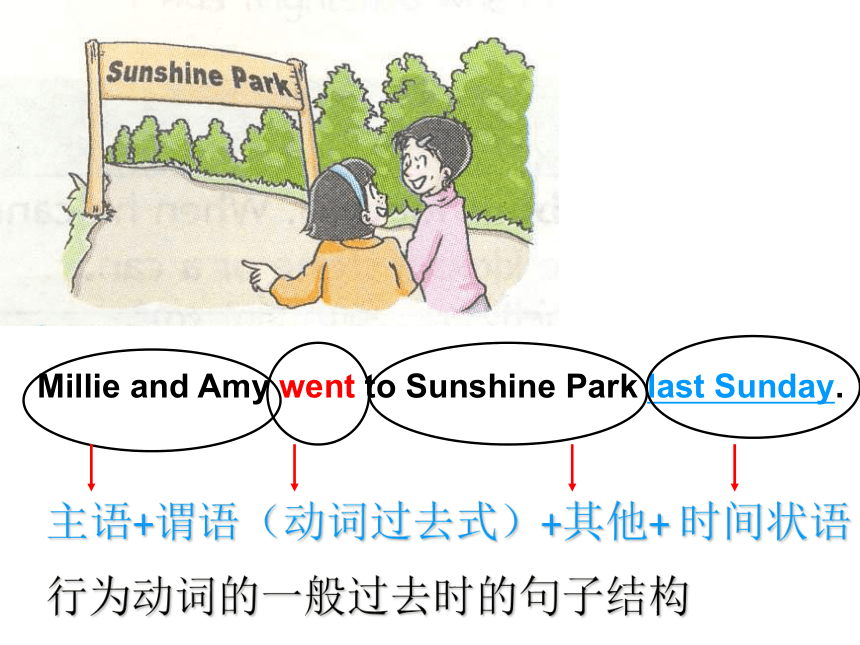
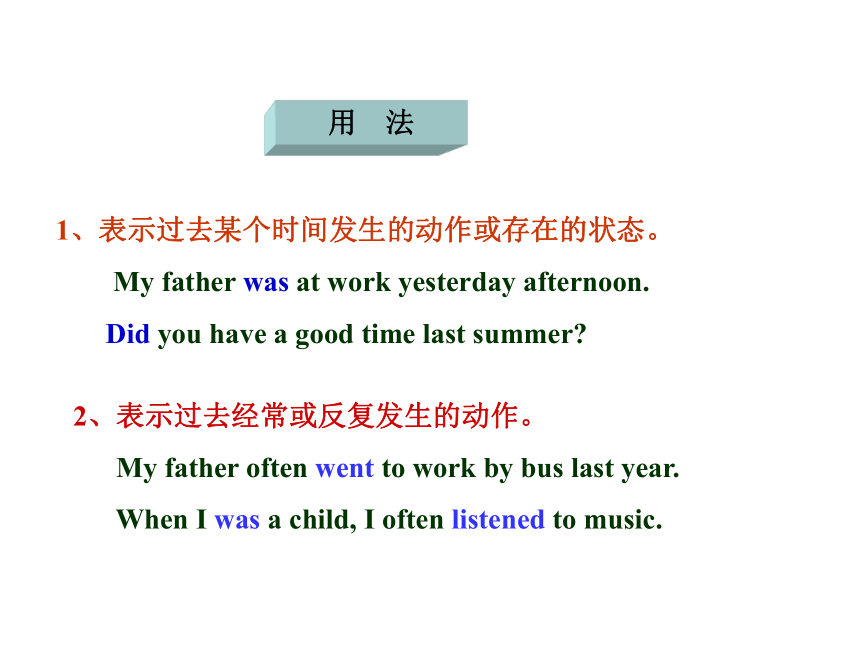
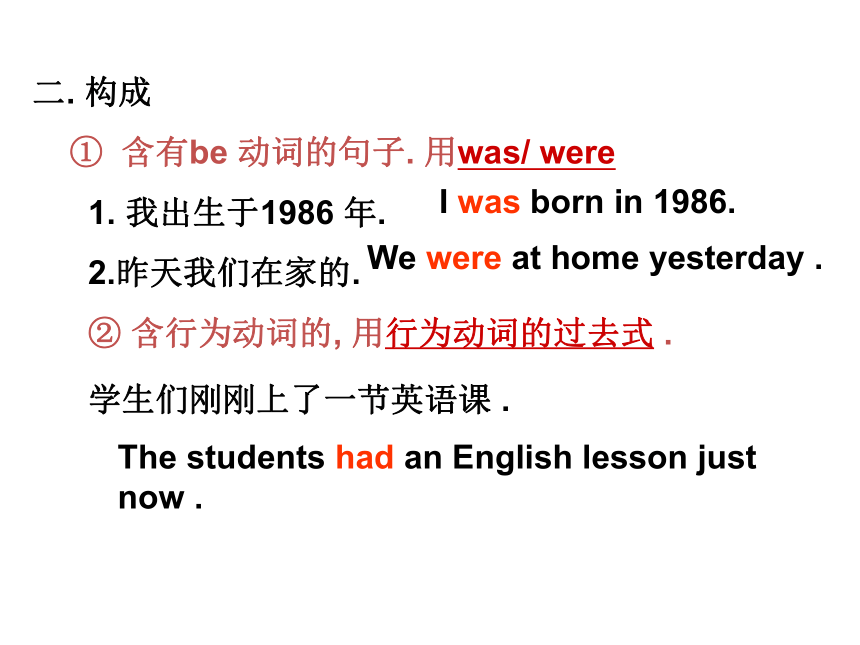
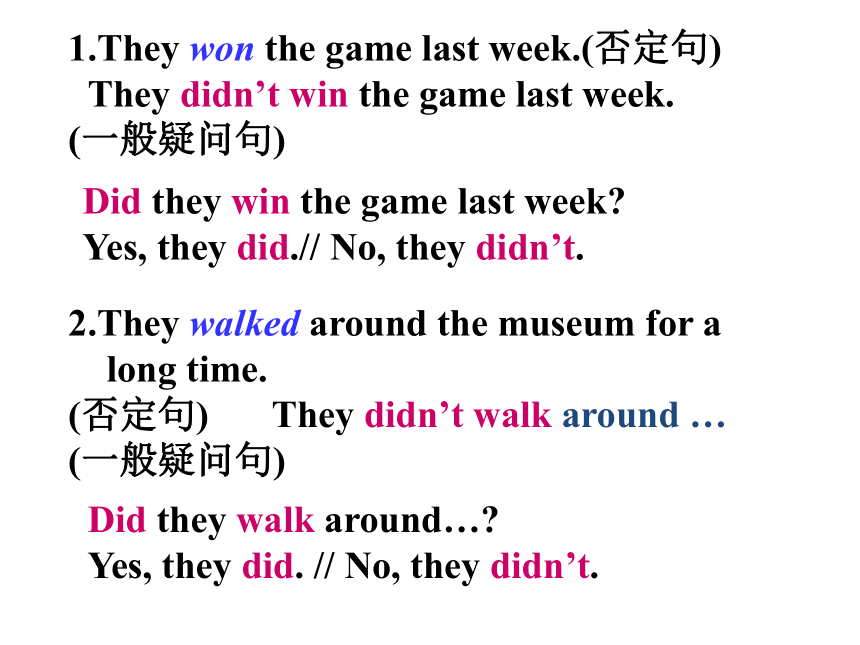
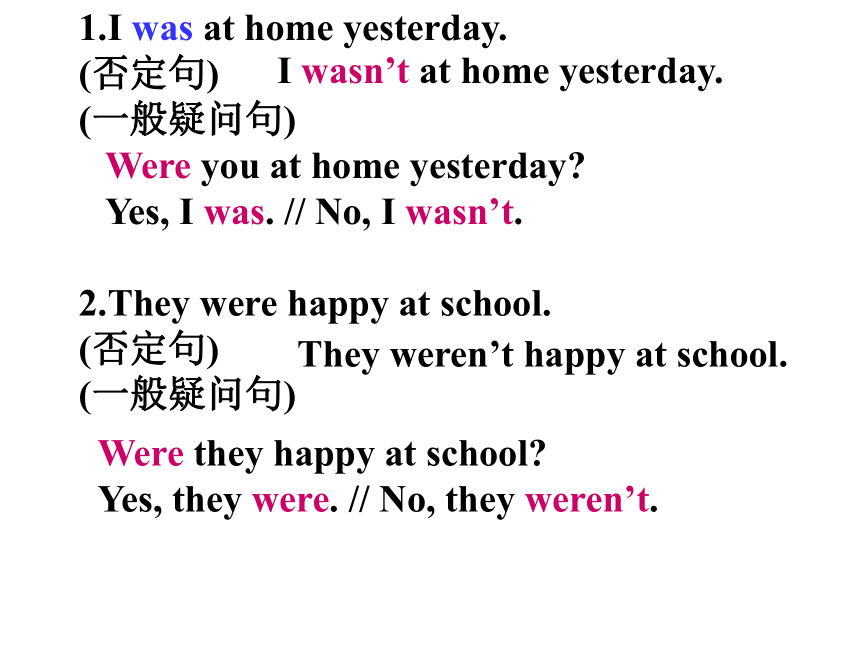
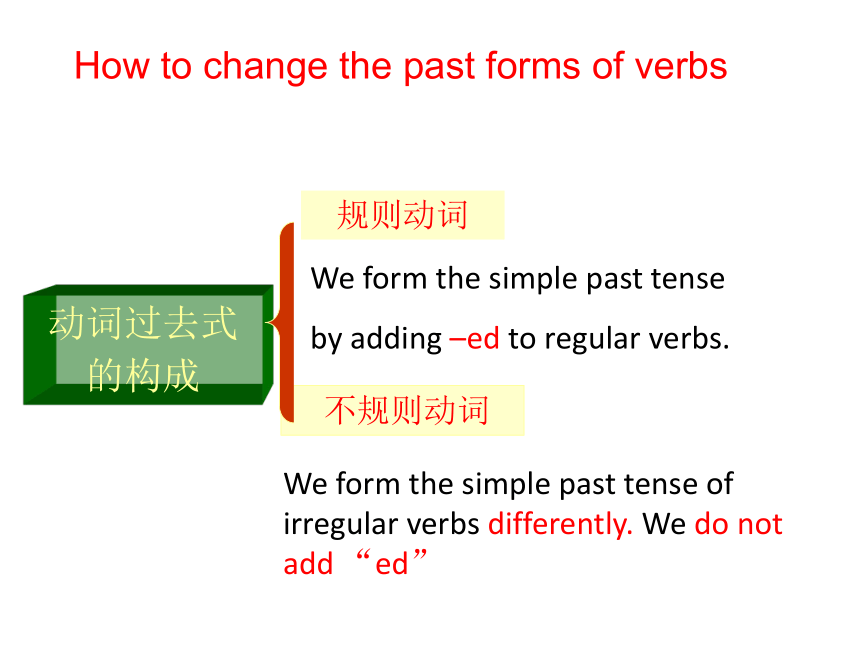
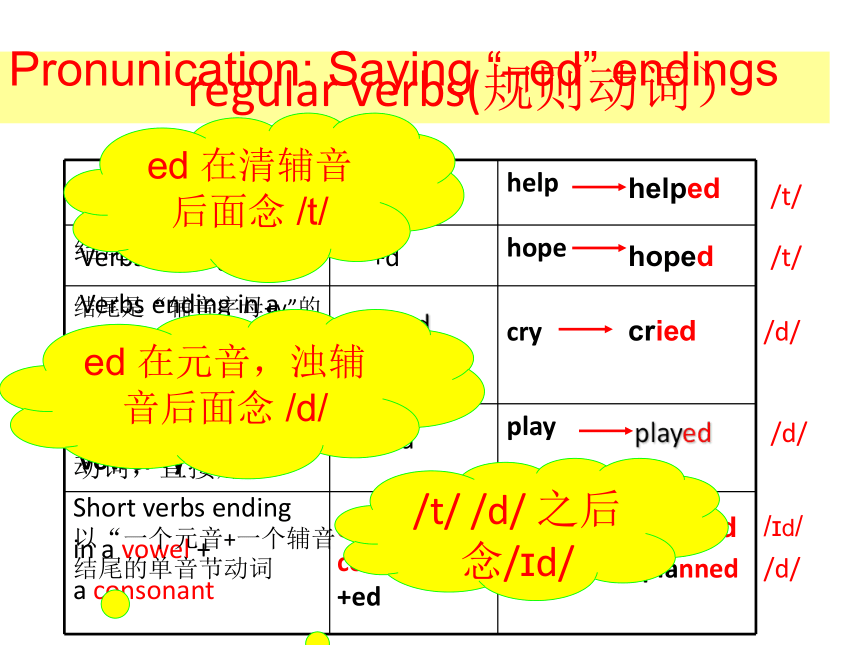
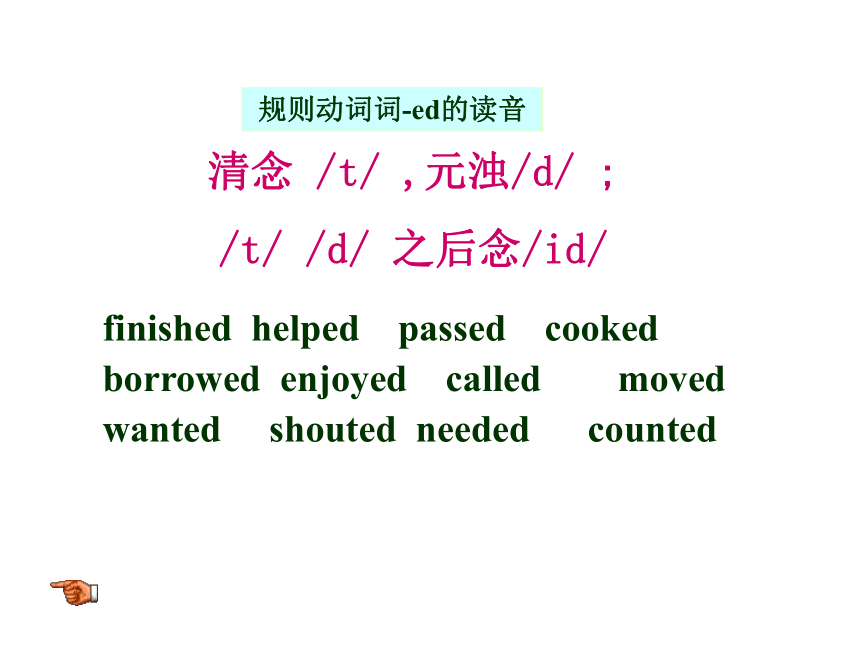
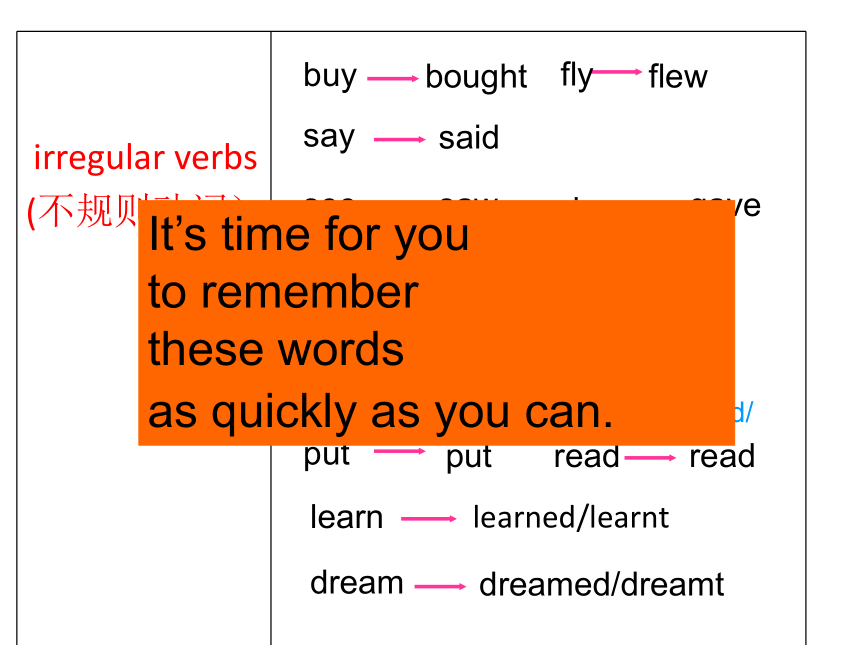
文档简介
Simple
Past
Tense
7下Unit
5
一般过去时
What
day
is
it
today?
Today
is....
What
day
was
it
yesterday?
Yesterday
was....
Complete
the
passage
with
correct
forms
of
the
verbs
It
_____(be)Sunday
morning.Millie
and
Amy
_____
(sit)
under
a
big
tree.They
______
(hear)
a
whisper
but
_______
(find)
nothing.
They
_____
(run)
away
and
_____
(meet)
Andy.He
_____
(go)
to
the
park
and
found
the
ghost
_____
(be)
a
cat.They
_____
(take)
the
cat
to
the
animal
centre.
was
sat
heard
found
ran
met
went
was
took
行为动词的一般过去时的句子结构
主语+谓语(动词过去式)+其他+
时间状语
Millie
and
Amy
went
to
Sunshine
Park
last
Sunday.
用
法
1、表示过去某个时间发生的动作或存在的状态。
My
father
was
at
work
yesterday
afternoon.
Did
you
have
a
good
time
last
summer?
2、表示过去经常或反复发生的动作。
My
father
often
went
to
work
by
bus
last
year.
When
I
was
a
child,
I
often
listened
to
music.
二.
构成
①
含有be
动词的句子.
用was/
were
1.
我出生于1986
年.
2.昨天我们在家的.
②
含行为动词的,
用行为动词的过去式
.
学生们刚刚上了一节英语课
.
The
students
had
an
English
lesson
just
now
.
We
were
at
home
yesterday
.
I
was
born
in
1986.
1.They
won
the
game
last
week.(否定句)
(一般疑问句)
2.They
walked
around
the
museum
for
a
long
time.
(否定句)
(一般疑问句)
They
didn’t
win
the
game
last
week.
Did
they
win
the
game
last
week?
Yes,
they
did.//
No,
they
didn’t.
They
didn’t
walk
around
…
Did
they
walk
around…?
Yes,
they
did.
//
No,
they
didn’t.
1.I
was
at
home
yesterday.
(否定句)
(一般疑问句)
2.They
were
happy
at
school.
(否定句)
(一般疑问句)
I
wasn’t
at
home
yesterday.
Were
you
at
home
yesterday?
Yes,
I
was.
//
No,
I
wasn’t.
They
weren’t
happy
at
school.
Were
they
happy
at
school?
Yes,
they
were.
//
No,
they
weren’t.
动词过去式
的构成
不规则动词
We
form
the
simple
past
tense
by
adding
–ed
to
regular
verbs.
We
form
the
simple
past
tense
of
irregular
verbs
differently.
We
do
not
add
“ed”
规则动词
How
to
change
the
past
forms
of
verbs
regular
verbs(规则动词)
help
hope
play
helped
hoped
cried
chatted
大多数动词末尾加-ed
Most
verbs
+ed
Verbs
ending
in
-e
+d
结尾是e的动词加-d
Verbs
ending
in
a
consonant
+y
-y+ied
cry
结尾是“辅音字母+y”的
动词,先变“y”为“
i”
再加-ed
/t/
/t/
/d/
Verbs
ending
in
a
vowel
+y
+ed
played
/d/
/?d/
结尾是元音+y的
动词,直接加ed
Short
verbs
ending
in
a
vowel
+
a
consonant
double
the
consonant
+ed
以“一个元音+一个辅音”
结尾的单音节动词
chat
plan
planned
/d/
/t/
/d/
之后念/?d/
Pronunication:
Saying
“–ed”
endings
ed
在清辅音后面念
/t/
ed
在元音,浊辅音后面念
/d/
规则动词词-ed的读音
finished
helped
passed
cooked
borrowed
enjoyed
called
moved
wanted
shouted
needed
counted
清念
/t/
,元浊/d/
;
/t/
/d/
之后念/id/
irregular
verbs
(不规则动词)
learned/learnt
was
were
did
buy
fly
bought
flew
say
said
see
saw
give
gave
am/is
learn
are
do/does
had
have/has
put
put
read
read
dream
dreamed/dreamt
/ri:d/
/red/
It’s
time
for
you
to
remember
these
words
as
quickly
as
you
can.
p0
donate
learn
buy
see
get
have
are
do
put
am/is
fly
spend
start
______
love
_________
play
______
plan
______
9.
leave
_____
10.
tell
_____
11.
stand
_____
12.
bring
______
5.
reply
_____
6.
say
________
7.
meet
_____
8.
hear
______
started
played
loved
planned
said
replied
left
met
stood
told
heard
brought
Finish
Part
A
on
page
62
写出下列动词的过去式:
1.am/is
_________
2.go
____________
3.sit
_________
4.hear__________
5.turn
_________
6.ask___________
7.answer_________
8.listen_________
9.run
_________
10.see__________
11.happen________
12.say__________
13.stop
_________
14.carry________
15.hurry_________
16.stand________
17.look__________
e________
19.search________
20.find_________
was
went
sat
heard
turned
asked
answered
listened
ran
saw
happened
said
stopped
carried
hurried
stood
looked
came
searched
found
写出下列动词的过去式:
21.make
_________
22.put_________
23.open
_________
24.show________
25.take
_________
26.have________
27.chat
_________
28.write________
29.know
_________
30.leave________
31.spend_________
32.catch________
33.bring_________
34.play_________
35.start__________
36.begin_________
37.use
__________
38.cry
_________
39.get
__________
40.give
_________
made
put
opened
showed
took
had
chatted
wrote
knew
left
spent
caught
brought
played
started
began
used
cried
got
gave
一般过去时的时间状语:
last
Tuesday/week/month…
yesterday
(morning/afternoon…)
this
morning
…ago
(2
days
ago/5
weeks
ago…)
the
day
before
yesterday
in
+过去的年份
(in1860/
in
1978
…)
just
now
=
a
moment
ago
刚才
知识结构
一般过去时
构成
用法
常用时间
动词的过去式
1、表示过去某个时
间发生的动作或
存在的状态。
2、表示过去经常或
反复发生的动作。
yesterday/
morning…
last
night/week/month/
year/
Monday
in
1990
two
days
ago
/a
few
minutes
ago
Learn
by
yourselves
1.
I
_______
(be)
born
in
2000.
2.
We
________
(take)
a
lot
of
photos
last
month.
3.
Tom
______
(put)
the
books
in
the
bag
and
left
the
classroom.
4.
I
_______
(see)
a
UFO
in
the
sky
last
night.
5.
We
_______
(be)
at
home
yesterday.
6.
The
students
_______
(have)
a
Chinese
lesson
just
now.
7.
We
_______
(eat)
some
baozi
for
breakfast
this
morning.
8.
She
_________
(buy)
a
book
the
day
before
yesterday.
9.
Our
classmates
_________
(visit)
Huangqiao
Park
last
weekend.
10.
He
______
in
Shanghai
three
years
ago,
but
now
he
______
in
Taixing.
(live)
用所给词的适当形式填空
was
took
put
saw
were
had
ate
bought
visited
lived
lives
11
There
_______(not
be)
any
drinks
in
the
fridge
now
.
12
______
Millie
______(
ask)
Grandma
about
the
dress
last
Monday
?
13
Sandy
__________(wear)
a
red
and
white
T-shirt
today
.
14
At
weekends
,
I
like___________(
listen
)
to
English
songs
and
__________(
shop).
15
Daniel
_______(
go
)
to
the
Computer
Club
every
Tuesday
afternoon
.
aren’t
Did
ask
is
wearing
listening
shopping
goes
16
It’s
7:00
now.
The
students
___________
(read)
English
in
the
classroom
.
17
Don’t
shout
!
The
baby
___________
(sleep).
18
---
______
they
_______
(
live)
here
last
year?
---
Yes,
they
did.
19
He
________
(want)
to
be
a
teacher
when
he
was
13
years
old.
20
He
_______
(wait)
for
you
for
a
long
time
yesterday
.
21
He
often
______(
wait
)
for
you
in
your
office
.
are
reading
is
sleeping
Did
live
wanted
waited
waits
22.Daniel
always
______(
fly)
kites
after
school
.
Now
he
______________(
not
fly)
kites.
He
___________(
eat)
an
apple.
23.Our
class
______(
give)
a
fashion
show
two
days
ago
.
24.She
________(
play)
badminton
on
the
playground
a
moment
ago.
25.My
mother
often
________(
watch)
TV
in
the
evening
.
But
last
night
she
______________(
not
watch)TV
.
She
_______(
write)
to
her
friend.
26.Look,
the
boy
__________(
help)
the
old
man
___________(
carry)
the
water.
flies
isn’t
flying
is
eating
gave
played
watches
didn’t
watch
wrote
is
helping
(to)
carry
Talk
about:
past
and
present
Discussion
in
groups
of
four
In
the
past,
the
road
was
small
and
dirty,
but
now
the
road
is
wide
and
clean.
In
the
past,
the
houses
were
small
and
old,
but
now
the
houses
are
tall
and
nice.
In
the
past,
people
went
to
someplace
by
jiaozi
or
on
the
carriage.
Now,
people
go
to
someplace
by
car,
plane,
train
or
bus.
We
should
treasure
we
have.
We
mustn’t
waste
time
,money
or
food.
Now
we
have
wide
and
clean
roads,
tall
and
nice
houses.
And
we
have
a
happy
life.
Now
we
each
can
go
to
school
to
get
knowledge.
We
must
study
harder,
because
knowledge
is
power(力量).
Knowledge
is
wealth(财富).
This
morning,
we
_____
(go)
to
the
Fun
World
Museum.
When
we
____
(get)
to
the
museum,
there
_____
(be)
a
lot
of
people
there.
We
_____
(spend)
three
hours
in
the
museum.
I
____
(take)
a
lot
of
photos.
Some
of
us
_______
(buy)
cards
of
the
animals
there.
We
_____
(come)
back
to
school
at
1
p.m.
We
____
(have)
a
great
time!
went
were
spent
took
bought
came
had
got
今天上午
Finish
Part
B
on
page
62
Millie:
We
_____
(go)
to
the
Fun
World
Museum
the
day
before
yesterday,
Daniel.
It
____
(be)
so
interesting!
Daniel:
Really?
Tell
me
all
about
it.
Millie:
OK.
We
____
(see)
a
small
monkey,
only
11
centimetres
tall.
Daniel:
That’s
amazing!
What
else?
Millie:
We
also
_______
(learn)
about
some
strange
birds
like
dodos.
They
_____
(live)
on
the
earth
a
long
time
ago.
Daniel:
That’s
cool!
went
saw
was
learnt
lived
Finish
Part
C
on
page
62.
Last
year,
she
flew
to
Beijing
and
enjoyed
herself
there.
/flu:/
/d/
When
she
arrived
there,
he
couldn’t
believe
her
eyes.
/t/
After
walking
for
a
long
time,
she
stopped
to
have
a
rest.
/d/
In
the
afternoon,
she
visited
the
Palace
Museum,
and
saw
so
many
works
of
art.
/?d/
/s?:/
The
next
day,
He
took
a
boat
trip
in
Beihai
Park
and
it
was
great
fun.
/t?k/
/w?z/
She
had
lunch
in
Wangfujin
Street
and
tried
Beijing
Duck.
/h?d/
She
also
bought
some
souvenirs
for
her
friends.
/d/
/b?:t/
Homework
1.
Remember
the
irregular
verbs.
2.
Complete
exercises
in
this
period.
Past
Tense
7下Unit
5
一般过去时
What
day
is
it
today?
Today
is....
What
day
was
it
yesterday?
Yesterday
was....
Complete
the
passage
with
correct
forms
of
the
verbs
It
_____(be)Sunday
morning.Millie
and
Amy
_____
(sit)
under
a
big
tree.They
______
(hear)
a
whisper
but
_______
(find)
nothing.
They
_____
(run)
away
and
_____
(meet)
Andy.He
_____
(go)
to
the
park
and
found
the
ghost
_____
(be)
a
cat.They
_____
(take)
the
cat
to
the
animal
centre.
was
sat
heard
found
ran
met
went
was
took
行为动词的一般过去时的句子结构
主语+谓语(动词过去式)+其他+
时间状语
Millie
and
Amy
went
to
Sunshine
Park
last
Sunday.
用
法
1、表示过去某个时间发生的动作或存在的状态。
My
father
was
at
work
yesterday
afternoon.
Did
you
have
a
good
time
last
summer?
2、表示过去经常或反复发生的动作。
My
father
often
went
to
work
by
bus
last
year.
When
I
was
a
child,
I
often
listened
to
music.
二.
构成
①
含有be
动词的句子.
用was/
were
1.
我出生于1986
年.
2.昨天我们在家的.
②
含行为动词的,
用行为动词的过去式
.
学生们刚刚上了一节英语课
.
The
students
had
an
English
lesson
just
now
.
We
were
at
home
yesterday
.
I
was
born
in
1986.
1.They
won
the
game
last
week.(否定句)
(一般疑问句)
2.They
walked
around
the
museum
for
a
long
time.
(否定句)
(一般疑问句)
They
didn’t
win
the
game
last
week.
Did
they
win
the
game
last
week?
Yes,
they
did.//
No,
they
didn’t.
They
didn’t
walk
around
…
Did
they
walk
around…?
Yes,
they
did.
//
No,
they
didn’t.
1.I
was
at
home
yesterday.
(否定句)
(一般疑问句)
2.They
were
happy
at
school.
(否定句)
(一般疑问句)
I
wasn’t
at
home
yesterday.
Were
you
at
home
yesterday?
Yes,
I
was.
//
No,
I
wasn’t.
They
weren’t
happy
at
school.
Were
they
happy
at
school?
Yes,
they
were.
//
No,
they
weren’t.
动词过去式
的构成
不规则动词
We
form
the
simple
past
tense
by
adding
–ed
to
regular
verbs.
We
form
the
simple
past
tense
of
irregular
verbs
differently.
We
do
not
add
“ed”
规则动词
How
to
change
the
past
forms
of
verbs
regular
verbs(规则动词)
help
hope
play
helped
hoped
cried
chatted
大多数动词末尾加-ed
Most
verbs
+ed
Verbs
ending
in
-e
+d
结尾是e的动词加-d
Verbs
ending
in
a
consonant
+y
-y+ied
cry
结尾是“辅音字母+y”的
动词,先变“y”为“
i”
再加-ed
/t/
/t/
/d/
Verbs
ending
in
a
vowel
+y
+ed
played
/d/
/?d/
结尾是元音+y的
动词,直接加ed
Short
verbs
ending
in
a
vowel
+
a
consonant
double
the
consonant
+ed
以“一个元音+一个辅音”
结尾的单音节动词
chat
plan
planned
/d/
/t/
/d/
之后念/?d/
Pronunication:
Saying
“–ed”
endings
ed
在清辅音后面念
/t/
ed
在元音,浊辅音后面念
/d/
规则动词词-ed的读音
finished
helped
passed
cooked
borrowed
enjoyed
called
moved
wanted
shouted
needed
counted
清念
/t/
,元浊/d/
;
/t/
/d/
之后念/id/
irregular
verbs
(不规则动词)
learned/learnt
was
were
did
buy
fly
bought
flew
say
said
see
saw
give
gave
am/is
learn
are
do/does
had
have/has
put
put
read
read
dream
dreamed/dreamt
/ri:d/
/red/
It’s
time
for
you
to
remember
these
words
as
quickly
as
you
can.
p0
donate
learn
buy
see
get
have
are
do
put
am/is
fly
spend
start
______
love
_________
play
______
plan
______
9.
leave
_____
10.
tell
_____
11.
stand
_____
12.
bring
______
5.
reply
_____
6.
say
________
7.
meet
_____
8.
hear
______
started
played
loved
planned
said
replied
left
met
stood
told
heard
brought
Finish
Part
A
on
page
62
写出下列动词的过去式:
1.am/is
_________
2.go
____________
3.sit
_________
4.hear__________
5.turn
_________
6.ask___________
7.answer_________
8.listen_________
9.run
_________
10.see__________
11.happen________
12.say__________
13.stop
_________
14.carry________
15.hurry_________
16.stand________
17.look__________
e________
19.search________
20.find_________
was
went
sat
heard
turned
asked
answered
listened
ran
saw
happened
said
stopped
carried
hurried
stood
looked
came
searched
found
写出下列动词的过去式:
21.make
_________
22.put_________
23.open
_________
24.show________
25.take
_________
26.have________
27.chat
_________
28.write________
29.know
_________
30.leave________
31.spend_________
32.catch________
33.bring_________
34.play_________
35.start__________
36.begin_________
37.use
__________
38.cry
_________
39.get
__________
40.give
_________
made
put
opened
showed
took
had
chatted
wrote
knew
left
spent
caught
brought
played
started
began
used
cried
got
gave
一般过去时的时间状语:
last
Tuesday/week/month…
yesterday
(morning/afternoon…)
this
morning
…ago
(2
days
ago/5
weeks
ago…)
the
day
before
yesterday
in
+过去的年份
(in1860/
in
1978
…)
just
now
=
a
moment
ago
刚才
知识结构
一般过去时
构成
用法
常用时间
动词的过去式
1、表示过去某个时
间发生的动作或
存在的状态。
2、表示过去经常或
反复发生的动作。
yesterday/
morning…
last
night/week/month/
year/
Monday
in
1990
two
days
ago
/a
few
minutes
ago
Learn
by
yourselves
1.
I
_______
(be)
born
in
2000.
2.
We
________
(take)
a
lot
of
photos
last
month.
3.
Tom
______
(put)
the
books
in
the
bag
and
left
the
classroom.
4.
I
_______
(see)
a
UFO
in
the
sky
last
night.
5.
We
_______
(be)
at
home
yesterday.
6.
The
students
_______
(have)
a
Chinese
lesson
just
now.
7.
We
_______
(eat)
some
baozi
for
breakfast
this
morning.
8.
She
_________
(buy)
a
book
the
day
before
yesterday.
9.
Our
classmates
_________
(visit)
Huangqiao
Park
last
weekend.
10.
He
______
in
Shanghai
three
years
ago,
but
now
he
______
in
Taixing.
(live)
用所给词的适当形式填空
was
took
put
saw
were
had
ate
bought
visited
lived
lives
11
There
_______(not
be)
any
drinks
in
the
fridge
now
.
12
______
Millie
______(
ask)
Grandma
about
the
dress
last
Monday
?
13
Sandy
__________(wear)
a
red
and
white
T-shirt
today
.
14
At
weekends
,
I
like___________(
listen
)
to
English
songs
and
__________(
shop).
15
Daniel
_______(
go
)
to
the
Computer
Club
every
Tuesday
afternoon
.
aren’t
Did
ask
is
wearing
listening
shopping
goes
16
It’s
7:00
now.
The
students
___________
(read)
English
in
the
classroom
.
17
Don’t
shout
!
The
baby
___________
(sleep).
18
---
______
they
_______
(
live)
here
last
year?
---
Yes,
they
did.
19
He
________
(want)
to
be
a
teacher
when
he
was
13
years
old.
20
He
_______
(wait)
for
you
for
a
long
time
yesterday
.
21
He
often
______(
wait
)
for
you
in
your
office
.
are
reading
is
sleeping
Did
live
wanted
waited
waits
22.Daniel
always
______(
fly)
kites
after
school
.
Now
he
______________(
not
fly)
kites.
He
___________(
eat)
an
apple.
23.Our
class
______(
give)
a
fashion
show
two
days
ago
.
24.She
________(
play)
badminton
on
the
playground
a
moment
ago.
25.My
mother
often
________(
watch)
TV
in
the
evening
.
But
last
night
she
______________(
not
watch)TV
.
She
_______(
write)
to
her
friend.
26.Look,
the
boy
__________(
help)
the
old
man
___________(
carry)
the
water.
flies
isn’t
flying
is
eating
gave
played
watches
didn’t
watch
wrote
is
helping
(to)
carry
Talk
about:
past
and
present
Discussion
in
groups
of
four
In
the
past,
the
road
was
small
and
dirty,
but
now
the
road
is
wide
and
clean.
In
the
past,
the
houses
were
small
and
old,
but
now
the
houses
are
tall
and
nice.
In
the
past,
people
went
to
someplace
by
jiaozi
or
on
the
carriage.
Now,
people
go
to
someplace
by
car,
plane,
train
or
bus.
We
should
treasure
we
have.
We
mustn’t
waste
time
,money
or
food.
Now
we
have
wide
and
clean
roads,
tall
and
nice
houses.
And
we
have
a
happy
life.
Now
we
each
can
go
to
school
to
get
knowledge.
We
must
study
harder,
because
knowledge
is
power(力量).
Knowledge
is
wealth(财富).
This
morning,
we
_____
(go)
to
the
Fun
World
Museum.
When
we
____
(get)
to
the
museum,
there
_____
(be)
a
lot
of
people
there.
We
_____
(spend)
three
hours
in
the
museum.
I
____
(take)
a
lot
of
photos.
Some
of
us
_______
(buy)
cards
of
the
animals
there.
We
_____
(come)
back
to
school
at
1
p.m.
We
____
(have)
a
great
time!
went
were
spent
took
bought
came
had
got
今天上午
Finish
Part
B
on
page
62
Millie:
We
_____
(go)
to
the
Fun
World
Museum
the
day
before
yesterday,
Daniel.
It
____
(be)
so
interesting!
Daniel:
Really?
Tell
me
all
about
it.
Millie:
OK.
We
____
(see)
a
small
monkey,
only
11
centimetres
tall.
Daniel:
That’s
amazing!
What
else?
Millie:
We
also
_______
(learn)
about
some
strange
birds
like
dodos.
They
_____
(live)
on
the
earth
a
long
time
ago.
Daniel:
That’s
cool!
went
saw
was
learnt
lived
Finish
Part
C
on
page
62.
Last
year,
she
flew
to
Beijing
and
enjoyed
herself
there.
/flu:/
/d/
When
she
arrived
there,
he
couldn’t
believe
her
eyes.
/t/
After
walking
for
a
long
time,
she
stopped
to
have
a
rest.
/d/
In
the
afternoon,
she
visited
the
Palace
Museum,
and
saw
so
many
works
of
art.
/?d/
/s?:/
The
next
day,
He
took
a
boat
trip
in
Beihai
Park
and
it
was
great
fun.
/t?k/
/w?z/
She
had
lunch
in
Wangfujin
Street
and
tried
Beijing
Duck.
/h?d/
She
also
bought
some
souvenirs
for
her
friends.
/d/
/b?:t/
Homework
1.
Remember
the
irregular
verbs.
2.
Complete
exercises
in
this
period.
